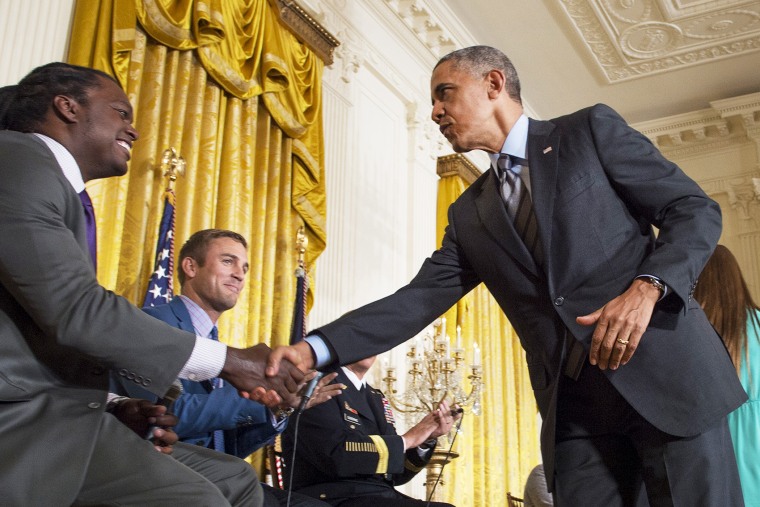President Obama on Thursday expressed his concern both as a parent and as a sports fan that too little is known about the lasting effects sports-related concussions have on young athletes.
Taking on the issue at the White House Thursday, the president brought together a range of sports organizations, medical experts, parent activists, and young athletes in an effort to counter a culture that expects athletes to play through serious injuries.
“We need more athletes to understand how important it is to do what we can to prevent injuries and to admit them when they do happen,” Obama said. “We have to change a culture that says ‘suck it up.’”
The president emphasized the importance of sports not only in his personal life -- he has been open about his love of basketball and golf -- but also his experience as a dad with two active teenage girls. First lady Michelle Obama has made youth nutrition and exercise a hallmark of her legacy in the White House, while Sasha and Malia Obama have tried out everything from track and field, to soccer and basketball, he said.
“Sports are important to our life as a family like they are for families all across the country,” Obama said.
The president first raised attention to the issue of sports injuries -- particularly head trauma -- after he admitted in an interview last year that if he had a son, he’d “have to think long and hard” before letting him play football.
A rise in a awareness around traumatic brain injuries in professional football has given the nation pause for whether similar adverse effects from the game could also impact young players.
The National Football League and former players reached a $765 million settlement over the impact of past concussions last year until a federal judge in January rejected preliminary approval.
Obama said there was a great deal of concern and uncertainty over sports concussions, but the issue was not limited to just young football athletes. “As parents though, we want to keep them safe,” Obama said, “and that means we have to have better information.”
The Institute of Medicine and the National Research Council released a study last fall, pointing to the lack of data covering sports-related concussions in youth and a “culture of resistance” among athletes who were reluctant to report their injuries.
The White House said it will be boosting research and data collection with a $30 million joint effort by the NCAA and the Department of Defense. The NFL is also pledging $25 million over the next three years for new pilot programs to expand athletic trainers in schools, while the National Institutes of Health is dedicating $16 million of a previous donation from NFL to study the chronic effects of repetitive concussions.
Young people make nearly 250,000 emergency room visits each year over sports-related or recreational head injuries, Obama said, citing a Center for Disease Control and Prevention report. But he added more must be done to not only protect young kids’ safety, but to understand what lasting harm sports injuries have on them.
“While the number of concussions reported among young athletes has risen over the past decade, one reason is likely because players coaches and parents better understand symptoms of these injuries,” Obama said. “Still, there’s more work to do.”
